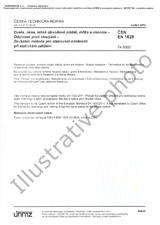We need your consent to use the individual data so that you can see information about your interests, among other things. Click "OK" to give your consent.
ČSN EN ISO 16638-1 (404309)
Radiological protection - Monitoring and internal dosimetry for specific materials - Part 1: Inhalation of uranium compounds
Translate name
STANDARD published on 1.5.2018
The information about the standard:
Designation standards: ČSN EN ISO 16638-1
Classification mark: 404309
Catalog number: 504342
Publication date standards: 1.5.2018
SKU: NS-845540
The number of pages: 56
Approximate weight : 168 g (0.37 lbs)
Country: Czech technical standard
Category: Technical standards ČSN
The category - similar standards:
Annotation of standard text ČSN EN ISO 16638-1 (404309):
This International Standard specifies the minimum requirements for the design of professional programmes to monitor workers exposed to uranium compounds. It establishes principles for the development of compatible goals and requirements for monitoring programmes and dose assessment for workers occupationally exposed to internal contamination. It establishes procedures and assumptions for risk analysis, monitoring programmes and the standardised interpretation of monitoring data in order to achieve acceptable levels of reliability for uranium and its compounds. It sets limits for the applicability of the procedures in respect to dose levels above which more sophisticated methods have to be applied.
Uranium is both radiologically and chemically toxic. Hence, the scientific bases of current occupational exposure standards are reviewed in addition to radiation exposure limits. This International Standard addresses those circumstances when exposure could be constrained by either radiological or chemical toxicity concerns.
This International Standard addresses, for uranium and its compounds, the following items:
- a) purposes of monitoring and monitoring programmes;
- b) description of the different categories of monitoring programmes;
- c) quantitative criteria for conducting monitoring programmes;
- d) suitable methods for monitoring and criteria for their selection;
- e) information that has to be collected for the design of a monitoring programme;
- f) general requirements for monitoring programmes (e.g. detection limits, tolerated uncertainties);
- g) frequencies of measurements;
- h) procedures for dose assessment based on reference levels for routine and special monitoring programmes;
- i) assumptions for the selection of dose-critical parameter values;
- j) criteria for determining the significance of monitoring results;
- k) interpretation of workplace monitoring results;
- l) uncertainties arising from dose assessment and interpretation of bioassays data;
- m) reporting/documentation;
- n) quality assurance;
- o) record keeping requirements.
It is not applicable to the following items:
- a) monitoring of exposure due to uranium progeny, including radon;
- b) detailed descriptions of measuring methods and techniques for uranium;
- c) dosimetry for litigation cases;
- d) modelling for the improvement of internal dosimetry;
- e) potential influence of counter-measures (e.g. administration of chelating agents);
- f) investigation of the causes or implications of an exposure;
- g) dosimetry for ingestion exposures and for contaminated wounds
Preview of the standard ČSN EN ISO 16638-1 (404309)
We recommend:
Technical standards updating
Do you want to make sure you use only the valid technical standards?
We can offer you a solution which will provide you a monthly overview concerning the updating of standards which you use.
Would you like to know more? Look at this page.




 Cookies
Cookies
